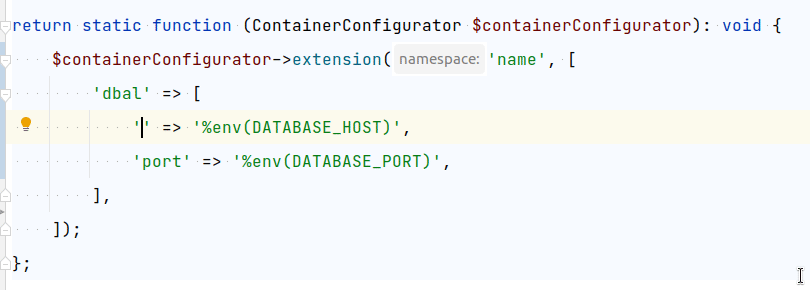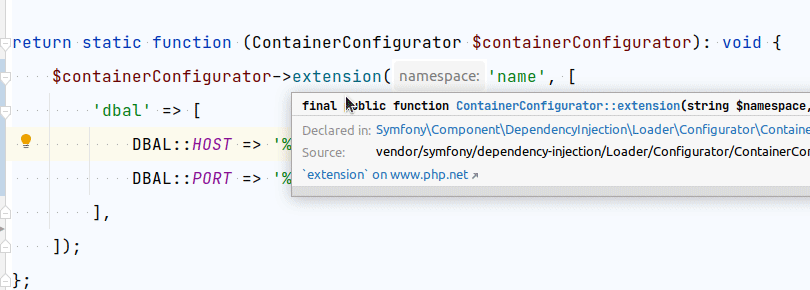4 Ways Symplify makes Working With Symfony More Fun
Are you new to Symplify? In short, it's a set of packages I wrote that focuses on improving daily PHP development. It brings joy to the code, so you can focus more on what you love.
Are you a Symplify power user? You still might find some new tricks you didn't know about.
"If you're just safe about the choices you make,
you don't grow."
1. Is the Annotation available as the Attribute?
From phpstan-rules packageSome Symfony annotations are already available as attributes since Symfony 5.2, e.g., route:
use Symfony\Component\Routing\Annotation\Route;
class SomeController
{
- /**
- * @Route("/path", name="action")
- */
+ #[Route(path: '/path', name: 'action')]
public function someAction()
{
}
}
But not everyone is aware of those. Let's try it. Do you know which 61 Validation annotations are available as attributes?
I have no idea, but we have PHPStan for that. Resp. Symplify\PHPStanRules\Rules\PreferredAttributeOverAnnotationRule class.
It warns us to be about every annotation usage, where the attribute should be used instead.
use Symfony\Component\Routing\Annotation\Route;
class SomeController
{
/**
* @Route("/path", name="action")
*/
public function someAction()
{
}
}
❌
use Symfony\Component\Routing\Annotation\Route;
class SomeController
{
#[Route(path: "/path", name: "action")]
public function someAction()
{
}
}
✅
You can configure it yourself or use default setup:
# phpstan.neon
includes:
- vendor/symplify/phpstan-rules/config/symfony-rules.neon
- vendor/symplify/phpstan-rules/config/services/services.neon
2. Is Parameter in Config used Just Once?
From phpstan-rules packageCyclic dependencies, nested package method calls on mixed types everywhere are the most annoying bugs that take hours to find. Well, until you make a typo or override something, you've defined two lines above.
One of these places is in Symfony PHP configs. If you haven't switched from YAML to PHP, do it today. Then you can have this bug too:
use Symfony\Component\DependencyInjection\Loader\Configurator\ContainerConfigurator;
return function (ContainerConfigurator $containerConfigurator): void {
$parameters = $containerConfigurator->parameters();
$parameters->set('secret_hash', 'ASDF1234');
// this should never happen! it overrides the first param set
$parameters->set('secret_hash', 'ASFD1234');
};
The secret_hash should be ASDF1234, but it's not. Why?
There is more than just a new kind of bug in your project... well, to be honest, this bug can happen in YAML too, and there is no way to detect it.
In PHP we have a great team member that helps with details that matters - a PHPStan rule:
rules:
- Symplify\PHPStanRules\Rules\PreventDoubleSetParameterRule
Now you can type configs as you like, and PHPStan will warn you about every duplicated param in your config!
✅
3. Autowire List of Services
From autowire-array-parameter packageLet's say you are writing a book, and apart from the text, you have all kinds of resources - images, tool output in txt, PHP code snippets, etc. There are single BookProcessor services that collect many ResourceProcessorInterface:
-
ImageResourceProcessor -
OutputResourceProcessor -
PHPSnippetResourceProcessor
How would you pass all of them to BookProcessor?
use Symfony\Component\DependencyInjection\Loader\Configurator\ContainerConfigurator;
use function Symfony\Component\DependencyInjection\Loader\Configurator\tagged_iterator;
return function (ContainerConfigurator $containerConfigurator): void {
$services = $containerConfigurator->services();
$resourceProcessorTag = 'resource_processor';
$services->instanceof(ResourceProcessorInterface::class)
->tag($resourceProcessorTag);
$services->set(BookProcessor::class)
->bind('$resourceProcessors', tagged_iterator($resourceProcessorTag));
};
That looks like a valid Symfony code. But what if you register a resource processor in another config or package? Boom, it's missed out. Three hours later, you want to kill yourself. And there is more problems on the way.
We can reduce this boring code to:
use Symfony\Component\DependencyInjection\Loader\Configurator\ContainerConfigurator;
- use function Symfony\Component\DependencyInjection\Loader\Configurator\tagged_iterator;
return function (ContainerConfigurator $containerConfigurator): void {
$services = $containerConfigurator->services();
-
- $resourceProcessorTag = 'resource_processor';
-
- $services->instanceof(ResourceProcessorInterface::class)
- ->tag($resourceProcessorTag);
-
- $services->set(BookProcessor::class)
- ->bind('$resourceProcessors', tagged_iterator($resourceProcessorTag));
};
Much better. How did we do it? With autowired array compiler pass:
+use Symplify\AutowireArrayParameter\DependencyInjection\CompilerPass\AutowireArrayParameterCompilerPass;
use Symfony\Component\HttpKernel\Kernel;
final class AppKernel extends Kernel
{
protected function build(ContainerBuilder $containerBuilder): void
{
+ $containerBuilder->addCompilerPass(new AutowireArrayParameterCompilerPass());
}
}
Everything else still looks the same. You've just made your configs more readable and code more robust.
✅
4. What is the Doctrine Extension key name in the config?
From amnesia packageWhen you switch to PHP configs, you realize how many kinds of strings there are:
- configuration key
- configuration value
- env value
The first one is always the same. It's defined in the documentation, e.g., for Doctrine keys. But would you go to documentation and google for a string, or would you use your IDE to help out?
I'm lazy, so I go with the latter one. A typical example is hostname, host... or was it host_name?

There are few other classes you can use:
-
Symplify\Amnesia\ValueObject\Symfony\Extension\DoctrineExtension -
Symplify\Amnesia\ValueObject\Symfony\Extension\Doctrine\DBAL -
Symplify\Amnesia\ValueObject\Symfony\Extension\Doctrine\ORM -
Symplify\Amnesia\ValueObject\Symfony\Extension\Doctrine\Mapping
and more.
This is how we use it on getrector.com configs:
use Symfony\Component\DependencyInjection\Loader\Configurator\ContainerConfigurator;
use function Symplify\Amnesia\Functions\env;
use Symplify\Amnesia\ValueObject\Symfony\Extension\Doctrine\DBAL;
use Symplify\Amnesia\ValueObject\Symfony\Extension\Doctrine\Mapping;
use Symplify\Amnesia\ValueObject\Symfony\Extension\Doctrine\ORM;
use Symplify\Amnesia\ValueObject\Symfony\Extension\DoctrineExtension;
return function (ContainerConfigurator $containerConfigurator): void {
$containerConfigurator->extension(DoctrineExtension::NAME, [
DoctrineExtension::DBAL => [
DBAL::DRIVER => 'pdo_mysql',
DBAL::SERVER_VERSION => '5.7',
DBAL::PASSWORD => env('DATABASE_PASSWORD'),
],
DoctrineExtension::ORM => [
ORM::MAPPINGS => [
'demo' => [
Mapping::IS_BUNDLE => false,
Mapping::TYPE => Mapping::TYPE_ANNOTATION,
// ...
]
// ...
This way, we can easily see:
- what is a constant configuration
- and what is a manually defined value
Little extras: have you ever made typo in %env(...)?

Use env() function so save the hustle. Thanks enumag for the tip!
That's all for today. I hope you will use some of these tools to become a lazier and happier developer.
Happy coding!
Do you learn from my contents or use open-souce packages like Rector every day?
Consider supporting it on GitHub Sponsors.
I'd really appreciate it!